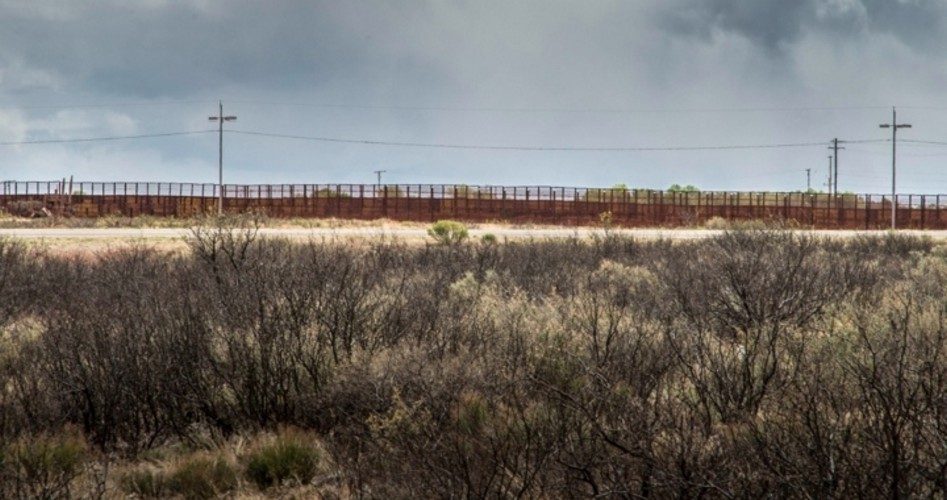
According to Judicial Watch, for some time Mexican drug cartels have been helping Islamic terrorists now living in Mexico to cross the U.S. border in order to explore possible areas of attack in the United States. The wachdog group reports:
Among the jihadists that travel back and forth through the porous southern border is a Kuwaiti named Shaykh Mahmood Omar Khabir, an ISIS operative who lives in the Mexican state of Chihuahua not far from El Paso, Texas. Khabir trained hundreds of Al Qaeda fighters in Pakistan, Afghanistan and Yemen and has lived in Mexico for more than a year, according to information provided by JW’s [Judicial Watch’s] government source.
In a recent article, Khabir bragged to the Italian newspaper il Giornale, “The border that separates Mexico from the United States is so full of free zones that I could come in with a group of men in a few hours and kill thousands of people in Texas or Arizona.”
Considering the full weight of the statements by Khabir and the recent findings by Judicial Watch, there has never been a more important time to secure the southern border of the United States.
According to il Giornale, the Mexican secretary of foreign affairs stated:
The Obama administration and the American media are guilty of neglecting the phenomenon. We cannot understand whether it is a strategy, but this new wave of fundamentalism could have some surprises for the United States.
In spite of Mexico’s large Catholic component, Khabir maintains that extremism has made large strides in the Mexican culture. Claiming thousands of converts over the last six to eight years, Khabir asserts that Muslim imams have had great recruiting success and have been welcomed in the Mexican society more so even than with the European culture.
According to the Judicial Watch report, “Now Khabir trains thousands of men — mostly Syrians and Yemenis — to fight in an ISIS base situated in the Mexico-U.S. border region near Ciudad Juárez.”
If indeed the reports are accurate and Khabir is living near the U.S.-Mexico border, the prospect of a porous border combined with nearly nonexistent immigration standards should raise red flags not only in U.S.-Mexico border states, but across the country.
Even Politifact, a left-leaning political fact-checking group owned by the Tampa Bay Times, admitted the concern when in an April 2016 article, author Joshua Gillin noted,
There have been several reported incidents along the U.S.-Mexico border of several agencies encountering people on terrorism watch lists or with ties (or suspected ties) to terrorist groups. There also have been a number of people from countries associated with terror groups stopped by authorities, although that’s not an indication they’re terrorist infiltrators.
But is it reasonable to suspect that some of these “people from countries associated with terror groups” could be “terrorist infiltrators,” particularly considering that agencies have encountered “people on terrorism watch lists”? Though Gillin may appear to be downplaying the threat, the truth stands: Our porous border has reached critical mass.
The New American recently reported in this article on the nearly nonexistent southern U.S. border, quoting Brandon Judd, president of the National Border Patrol Council: “As someone who has been involved in border protection for over 18 years, I can tell you the border is not secure and the situation is getting worse.”
In other statements also reported by The New American, Judd testified to the U.S. House Judiciary Committee that border patrol agents were told by “a top Homeland Security official” that the Obama administration had “no intention of deporting” a large number of illegal immigrants sneaking into the country, and has instead issued orders for them to be released so they “don’t clog up the courts.” Judd added that even criminal cases involving illegal immigrants have found detainees being allowed to leave, having neither been deported nor given a Notice to Appear (NTA), which would have at least put them into the deportation process. (Emphasis added.)
Reporting in another article for The New American in March 2016, Alex Newman contended, “Smugglers and other criminals are pouring across the often undefended border … jeopardizing the livelihoods and even [the] lives [of Americans] — not to mention national security.”
Newman reported on a meeting between the elected officials of the small town of Animas, New Mexico, and hundreds of distraught ranchers:
Inspiring the meeting, according to attendees quoted in media reports, was the kidnapping of a local American ranch hand. The victim reportedly happened upon a caravan of drug runners from the other side of the border while working on a cattle ranch in New Mexico’s “Bootheel” region along the border with Mexico. Tricia Elbrock, co-owner of the company that employs the kidnapping victim, was quoted in the Albuquerque Journal recounting what happened in December of last year.
Also reporting for The New American, Warren Mass cited other statements by National Border Patrol Council President Brandon Judd,
We have apprehended illegal aliens just north of the border who are still soaking wet from crossing the river. If they claim, as increasingly they are doing, that they have been here since January 1, 2014, we will process and then release them.
They are still wet from the river and miles from any civilization and on their word alone we release them unless we physically saw them cross the river. This policy de facto creates an open border with Mexico for any illegal alien who wants to claim that they were here before 2014.
Obtaining information via the Freedom of Information Act, Judicial Watch in January made public State Department documents showing that for “at least” 10 years Arab extremists have entered our country with assistance from Mexican drug cartels. But why hasn’t the U.S. government, which has known about this security threat for at least a decade, responded by securing the border? Are “sleeper” terrorist cells already in place in the United States as a result of this folly? And what will be the consequences of continuing to leave the border unsecure?
Alex Newman observed,
Despite claims from politicians in Washington, D.C., it is clear that the border is nowhere close to what a reasonable person would describe as “secure.” That is by design, of course. But the people suffering on the front lines of that are only the first to be victimized. If Congress does not get serious about demanding the enforcement of federal laws on border security, all of America will face the consequences, too. It is time to restore law and order on the border.


